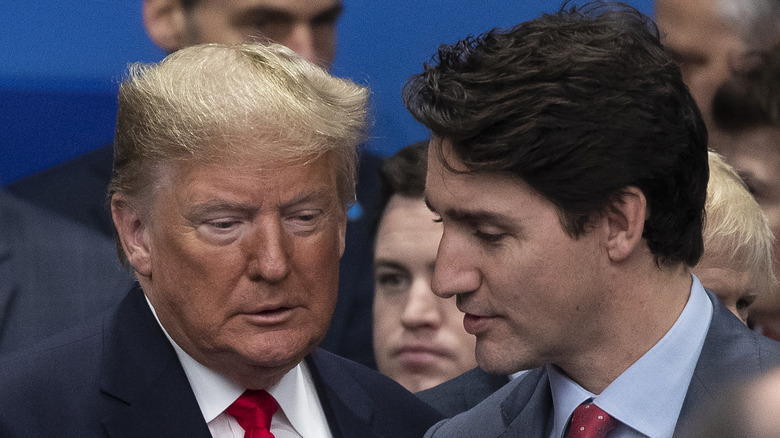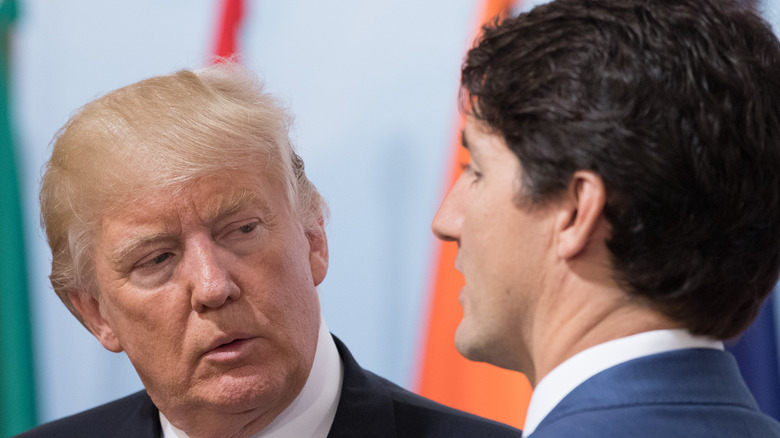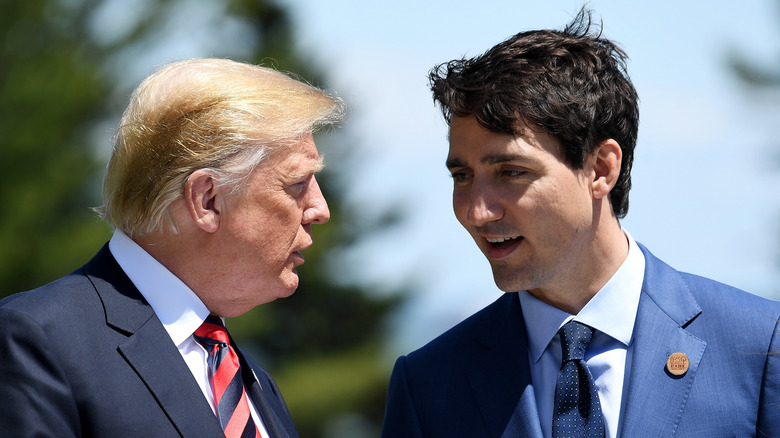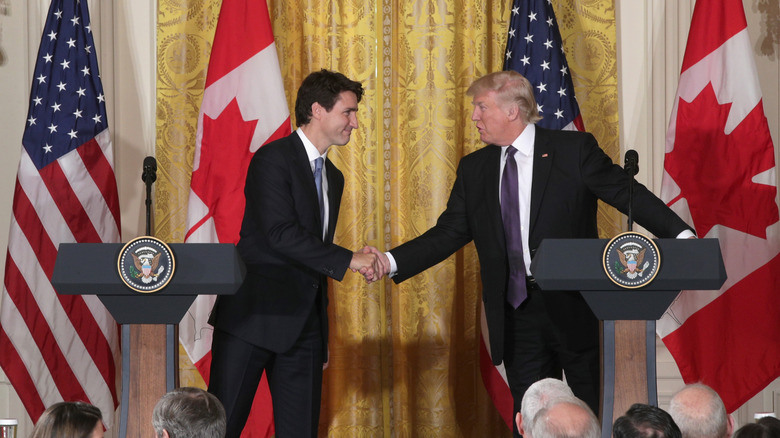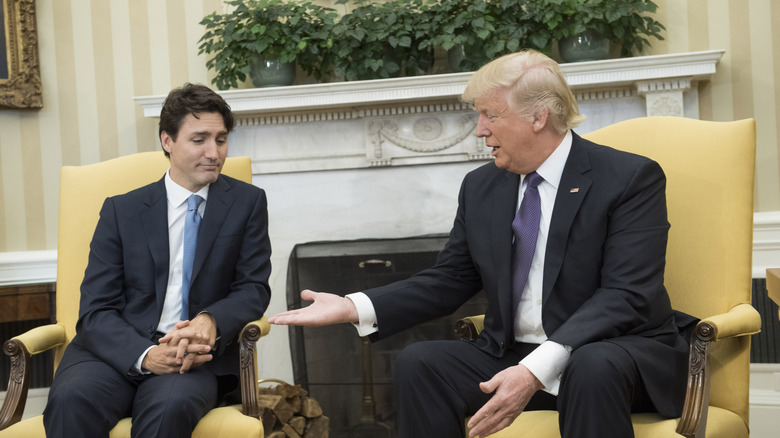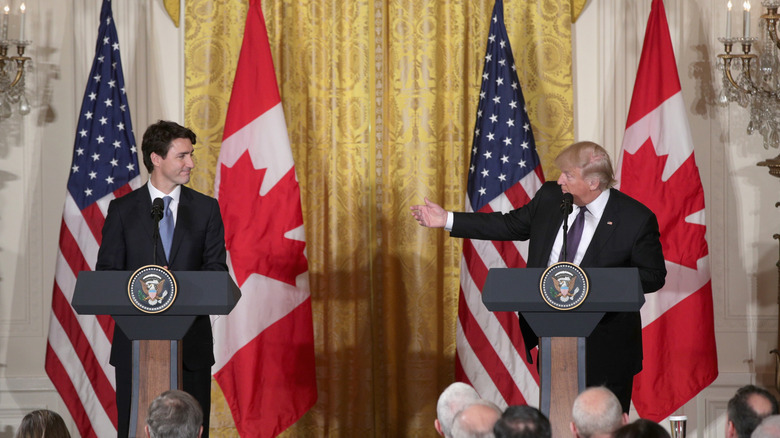The Shadiest Digs Trump And Justin Trudeau Have Thrown At Each Other
The dynamic between President-elect Donald Trump and outgoing Canadian Prime Minister Justin Trudeau has been one of the most talked-about political rivalries of recent years. Their interactions have often gone beyond standard diplomatic disagreements, spilling into the realm of personal shade. From international summits to social media posts, the two leaders have exchanged barbs that reflect their fundamentally different political approaches and personalities.
On the heels of Trudeau's announcement that he will step down after nearly a decade in power, many are reflecting on his legacy as a leader. However, one part of that legacy will undoubtedly be his tumultuous relationship with the 47th President-elect and former U.S. President. Their clashes over trade policies, tariffs, and international diplomacy often escalated into headline-grabbing moments that captivated audiences on both sides of the border.
These exchanges were not just about politics; they frequently revealed the sharp contrasts in their leadership styles. While Trump was known for his blunt, often combative rhetoric, Trudeau often took a more measured but equally pointed approach, delivering his criticisms with a dose of diplomacy. As Trudeau exits the political stage and Trump gears up for another transformation to the United States presidency, their relationship remains a fascinating case study in modern diplomacy—or the lack thereof. From Trump's infamous "two-faced" remark to the nicknames he has given to Trudeau and his critiques of U.S. tariffs, there is no shortage of shade between these two leaders to go around.
The G7 showdown
The 2018 G7 summit in Quebec provided another flashpoint in the Trump-Trudeau saga. After the summit, Trudeau criticized Trump's decision to impose tariffs on Canadian goods, stating, "Canadians are polite, we're reasonable, but we will not be pushed around," (via The Washington Post). Trump's reaction was swift and harsh. Trump took to Twitter to call Trudeau, "Very dishonest & weak," he continued his rant by defending his position on the tariffs, writing: "Our Tariffs are in response to his of 270% on dairy!" Soon after, Trump announced that the U.S. would withdraw its endorsement of the G7 communiqué. The move shocked many, as it underscored just how deeply personal Trump's response to criticism could be.
The fallout from this incident marked a low point in U.S./Canada relations during Trump's presidency. Trudeau's firm stance on Canadian sovereignty clashed directly with Trump's "America First" agenda, resulting in a highly publicized war of words. This moment illustrated how their disagreements often escalated beyond policy, turning into personal confrontations that dominated international headlines.
The NATO two-faced incident
One of the most unforgettable moments in President-elect Donald Trump and Justin Trudeau's history happened during the 2019 NATO summit. A candid video of Trudeau surfaced, showing him chatting with French President Emmanuel Macron, U.K Prime Minister Boris Johnson, and Dutch Prime Minister Mark Rutte. In the video, Trudeau appeared to mock Trump, commenting on the length of his press conferences. "He was late because he takes a 40-minute press conference off the top," Trudeau quipped (via CNN), prompting laughter from the group. The video quickly went viral, sparking headlines worldwide.
Trump responded sharply when asked about the incident during a press conference. "Well, he's two-faced," Trump said bluntly (via NPR). He also canceled his planned press conference and left the summit early, demonstrating his displeasure. "I find him to be a nice guy, but the truth is, I called him out on the fact that he's not paying 2%, and I guess he's not very happy about it," he said.
While Trudeau later clarified his remarks, explaining that he was commenting on Trump's unpredictability, the damage had already been done. This public exchange underscored the rocky relationship between the two leaders and highlighted how personal their interactions could become, even on an international stage. This moment remains a defining example of the strained dynamic between Trump and Trudeau, where even formal diplomatic events couldn't prevent their mutual disdain from surfacing.
Trudeau's tariff criticism
Outgoing Canadian Prime Minister Justin Trudeau has never shied away from critiquing President-elect Donald Trump's policies, particularly when it came to tariffs. During a 2024 event hosted by the Halifax Chamber of Commerce, Trudeau took aim at Trump's trade strategies. "Trump got elected on a commitment to make life better and more affordable for Americans, and I think people south of the border are beginning to wake up to the real reality that tariffs on everything from Canada would make life a lot more expensive," Trudeau said, according to the Associated Press.
In December 2024, tensions were high between the U.S. and Canada over the President-elect's threat to impose a 25% tariff on Canadian exports to motivate Canada and Mexico to take a more proactive approach to combating illegal immigration and drug trafficking. Trudeau's comments were seen as a direct critique of Trump's policies, suggesting they were counterproductive and harmful to American consumers. Trump, unsurprisingly, didn't take kindly to the remark. In subsequent speeches, he doubled down on his trade policies, framing them as necessary to protect American interests, and referred to Trudeau as the "Governor of Canada." This exchange showcased how Trudeau could deliver a pointed critique without resorting to overt hostility, contrasting with Trump's more combative style. It also highlighted the deep policy differences between the two leaders, particularly on economic issues.
The Governor of Canada remark
In a jab that blurred the lines between humor and shade, President-elect Donald Trump referred to former Canadian Prime Minister Justin Trudeau as "Governor of the Great State of Canada" in a Truth Social post in December 2024. This came after a meeting between Trump and Trudeau where they discussed tariffs and trade agreements at Mar-a-lago. "It was a pleasure to have dinner the other night with Governor Justin Trudeau of the Great State of Canada," Trump wrote on Truth Social. "I look forward to seeing the Governor again soon so that we may continue our in-depth talks on tariffs and trade, the results of which will be truly spectacular for all!"
The comment didn't sit well with Canadians, who were quick to remind Trump that Canada is an independent nation and not part of the United States. Political analysts saw the remark as a thinly veiled insult aimed at undermining Trudeau's authority. Trudeau, for his part, responded diplomatically but firmly. "I'm a fighter. Every bone in my body has always told me to fight because I care deeply about Canadians. I care deeply about this country, and I will always be motivated by what is in the best interest of Canadians," he said at a press briefing (via ABC News). This moment exemplifies Trump's tendency to use offhand remarks to ruffle feathers, while Trudeau maintained a more measured approach. Still, the dig left a lasting impression, becoming one of the most talked-about moments in their strained relationship.
Trudeau's resignation and Trump's parting shot
With Canadian Prime Minister Justin Trudeau's announcement that he would resign from office on the heels of President-elect Donald Trump's threats of tariffs and shady public criticism, the President-elect couldn't resist taking a final dig to double down on his shady "Governor of Canada" remark. "Many people in Canada LOVE being the 51st State. The United States can no longer suffer the massive Trade Deficits and Subsidies that Canada needs to stay afloat. Justin Trudeau knew this, and resigned," Trump posted on Truth Social.
The shade was in line with Trump's history of criticizing Trudeau, even as Trudeau remained largely diplomatic in his responses. While Trudeau has not directly addressed this parting shot, his resignation marks the end of a turbulent chapter in U.S.-Canada relations. "This country deserves a real choice in the next election, and it has become clear to me that if I am having to fight internal battles, I cannot be the best option in that election," Trudeau said announcing his resignation (via BBC). Trump's shady comments highlight how their interactions were often more about personal animosity than political strategy. As Trudeau exits the stage, his complicated relationship with Trump will undoubtedly be remembered as one of the defining aspects of his nine-year tenure.
